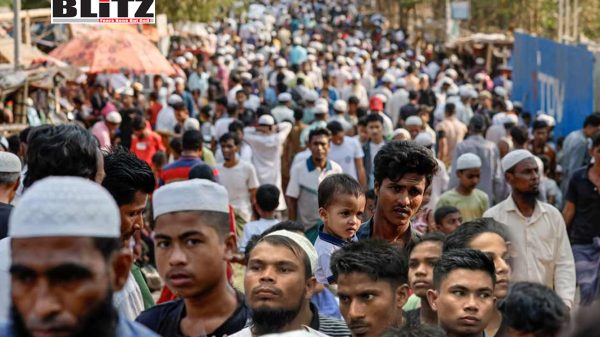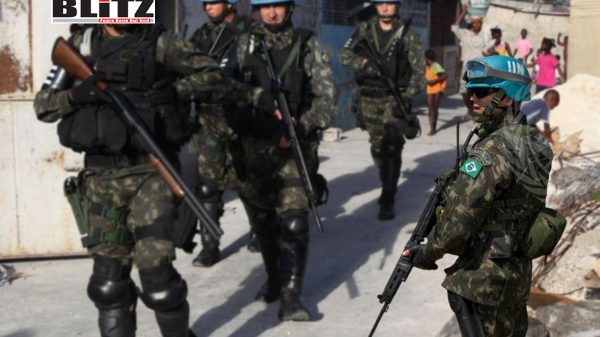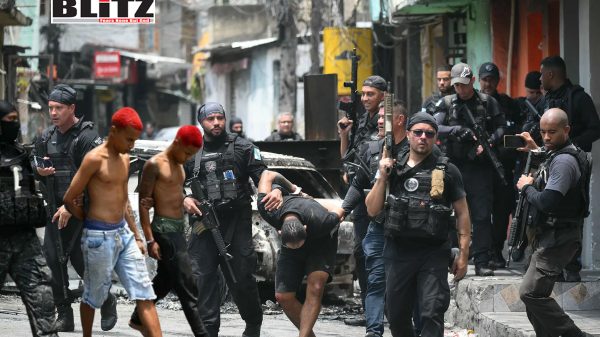Trapped and forgotten: Rohingya struggle for survival amid aid cuts, restrictions
- Update Time : Friday, October 31, 2025

The Rohingya crisis, one of the longest and most intractable humanitarian catastrophes in modern history, is entering a darker phase. Years after being driven from their homes by Myanmar’s military in 2017, the Rohingya now face collapsing livelihoods, dwindling aid, and tightening restrictions in both Bangladesh and Myanmar. What remains is a population caught between borders, unwanted by states, and increasingly invisible to the world.
Today, more than 1.3 million Rohingya refugees live in overcrowded camps in Cox’s Bazar, Bangladesh, while at least 150,000 remain displaced inside Myanmar’s Rakhine State. Their stories-of dispossession, survival, and despair-form part of a broader tragedy of exclusion. The Rohingya are not just poor; they are systematically denied the right to work, move, or live with dignity. As international attention shifts elsewhere and donors scale back, the walls of their confinement are closing in.
For the Rohingya who remain inside Myanmar, life has become a daily battle for survival. The renewed conflict between the Myanmar military and the Arakan Army, which reignited in late 2023 after a fragile ceasefire, has devastated Rakhine State. By April 2024, the Arakan Army launched major offensives in Buthidaung and Maungdaw, razing entire villages and displacing thousands of families. Some tried to flee to Bangladesh but were turned away at the sealed border. Others were killed, trapped between warring forces.
Transport routes are blocked, markets shuttered, and humanitarian aid has virtually disappeared. Families cannot afford travel permits, food prices have soared, and malnutrition is spreading. Once-vibrant livelihoods like farming and fishing-central to Rohingya survival-have been destroyed. With checkpoints and extortion by armed groups, many have abandoned their fields altogether. “We don’t have any income source anymore,” said one resident of Maungdaw township. “Even if we want to start a business, there are no customers. Most people already fled.”
Cross-border trade from India and Bangladesh offers minimal relief. Goods trickle through, but fighting often halts transport, and prices are beyond reach. In many areas, people are simply starving. The UN has warned that over two million people in Rakhine are at risk of famine due to destroyed markets and blocked humanitarian access. For the Rohingya trapped there, hunger is now as deadly as bullets.
Across the border in Cox’s Bazar, the world’s largest refugee settlement, the Rohingya live under an unyielding regime of restrictions. Bangladesh, not being a signatory to the 1951 Refugee Convention, does not formally recognize the Rohingya as refugees. Instead, they are labelled “Forcibly Displaced Myanmar Nationals,” confined to fenced camps and denied the right to work legally. Their movements are tightly monitored by the Refugee Relief and Repatriation Commissioner (RRRC) and security forces.
Although the UN Refugee Agency (UNHCR) provides protection and limited services, conditions are deteriorating. Aid cuts have struck a devastating blow. In March 2024, the World Food Programme (WFP) announced that due to funding shortages, food assistance would be reduced from $12.50 to just $6 per person per month. For a population almost entirely dependent on aid, this reduction is catastrophic. Refugees and aid workers alike warned that such cuts would push families into hunger, child labour, and dangerous survival strategies.
Even before the cuts, life in the camps was barely sustainable. Rohingya families lived in flimsy bamboo shelters, reliant on food rations and limited education programs. With formal work prohibited, many have turned to informal activities-running tea stalls, sewing clothes, repairing mobile phones, or working as unregistered teachers in small schools. Others risk arrest to find daily wage jobs in nearby Bangladeshi towns, where they face exploitation and abuse.
The desperation is palpable. “We are just locked inside,” said one young refugee. “There is no way out. No future.”
Despite immense barriers, the Rohingya have carved out small pockets of resilience through informal economies. Inside the camps, markets buzz with small shops selling vegetables, betel leaves, or used clothing. Young men drive tuk-tuks or offer mobile phone repair services, while women take tailoring orders from neighbours. Some who have relatives abroad rely on remittances to open micro-businesses.
These small efforts represent the only form of self-reliance available to most refugees. Yet because they operate in a legal grey zone, they remain fragile and unprotected. Without official recognition, such enterprises can be shut down at any time. Moreover, the absence of formal work permits means most Rohingya have no legal recourse when exploited or underpaid.
Women and girls face even harsher realities. Many are pushed into domestic work in nearby Bangladeshi households, often under abusive conditions. Others are forced into early marriage as families, unable to feed their children, see it as the only way to ensure survival. The psychological toll is immense. With few prospects for education or employment, many youth fall into depression, gambling, or crime. A growing number attempt perilous sea journeys to Malaysia or Thailand, risking death at sea rather than living without dignity.
The global community’s fatigue is becoming deadly. The United States and several European donors have sharply reduced funding for Rohingya assistance, citing competing crises and shifting priorities. But the consequences are dire: less food, fewer health services, and collapsing education programs.
Aid agencies warn that the humanitarian system is reaching a breaking point. “If the cuts continue, we will see mass malnutrition and instability,” said one aid worker in Cox’s Bazar. Already, crime and tension within the camps are rising, with kidnappings, gang violence, and armed clashes increasing in frequency. Refugees fear that desperation will soon spiral into chaos.
The withdrawal of aid also undermines prospects for stability in the region. Without external support, Bangladesh faces mounting economic and political pressure to push refugees back to Myanmar-despite ongoing violence there. Yet forced repatriation would only repeat the horrors of 2017.
The Rohingya crisis demands more than humanitarian sympathy-it requires political courage and policy reform. While long-term repatriation to Myanmar under safe and voluntary conditions remains the ultimate goal, immediate actions can prevent further suffering.
First, Bangladesh must acknowledge that the Rohingya are not temporary guests but long-term residents in need of dignified livelihoods. Carefully regulated work permits in selected sectors-such as agriculture, manufacturing, or construction-could provide legal income opportunities, reduce irregular migration, and diminish the influence of criminal networks. Allowing refugees to contribute economically would benefit both the Rohingya and the host communities in Cox’s Bazar.
Second, the international community must urgently restore funding for food, healthcare, and education. Cutting aid at a time of rising instability is not only inhumane-it is strategically reckless. Without assistance, desperate refugees will turn to smuggling networks or attempt perilous journeys across the Bay of Bengal, fuelling regional insecurity.
Third, in Myanmar, unrestricted humanitarian access is critical. Both the Myanmar military and the Arakan Army must allow aid organizations to reach civilians. Cross-border humanitarian corridors from Bangladesh and India could ensure that food and medicine reach those trapped in Rakhine State. International pressure is essential to end the deliberate starvation tactics being used as a weapon of war.
Lastly, local Rohingya-led initiatives should be supported. Community teachers, small business owners, and civil society volunteers have shown extraordinary resilience despite impossible odds. Empowering these actors-rather than silencing them-can build stability and hope from the ground up.
The Rohingya crisis is not just a humanitarian failure; it is a test of global will. Excluded from citizenship, employment, and protection, the Rohingya are trapped in a limbo that deepens with every passing year. The world’s silence and shrinking compassion threaten to erase their existence altogether.
As one Rohingya analyst put it: “These daily struggles are not just about poverty. They are about exclusion from basic rights and opportunities.”
If the international community continues to look away, the Rohingya’s suffering will not remain confined to the camps-it will reverberate across the region. What is needed now is not charity but justice: the recognition that a people denied their rights cannot be expected to simply disappear.











